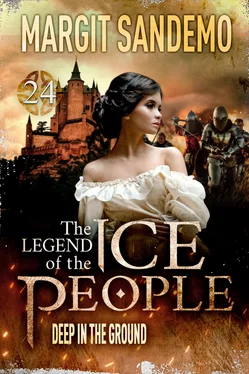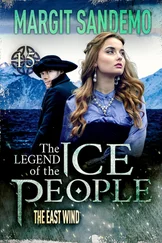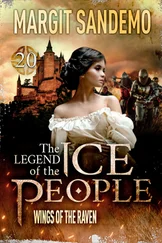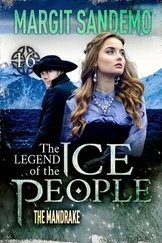But she had an unpleasant feeling inside, a nagging sense of despair, a need to do something for these poverty-stricken children, to become their friend and confidante, to really help them.
Especially little Egon in his thin rags, which were probably considered to be his best clothes.
Anna Maria observed him secretly now and then. His face had probably been washed clean before he left for school that day. At least she hoped so. But Egon looked as though he was the kind of boy who attracted dirt. His mousy hair stuck out on all sides, stiff with grease. Soil and dust and snot and tears had left streaky marks on his frightened face, and the much too large homespun trousers flapped around his frail body. They had a tear at the knee and his bony hands were blue with the cold.
Gustav’s two children needed medical attention – that was quite clear. They also risked infecting the other children if they hadn’t already done so. Even fragile little Egon, perhaps?
When all the children had learned the capital letter A and had written their first name on the board by following the teacher’s instructions, she felt that it was time for a song. Since they all knew the psalm with the words “Even though I walk through the valley of the shadow of death, I will fear no evil,” that was what they sang. The children probably knew it from having attended frequent funerals.
And that was when Bengt-Edvard’s true talent shone through! He had moaned and groaned over his long name when he had to write it on the board, and had wished that his name was Egon instead. Now he was singing with confidence and intensity, and had a voice like a future opera singer!
After the last verse Anna Maria looked at him in awe. “Do your parents know what a wonderful voice you have?”
He blushed with pride. “Yes, they want me to go to school so that I can manage better when I am out in the world. Sign contracts and that sort of thing so that I don’t get cheated. I’m going to be one of those people who goes on tours and earns a lot of money at markets.”
More than just at markets, Anna Maria thought, but she didn’t want to question his parents’ authority in the presence of the other children.
“Then we’ll try to teach you everything you need to know,” she said kindly. “And that’s all for today, children. It’s the first day and it’s been so cold in here. I’ll see you again on Friday at nine o’clock. You’ll only be attending school three days a week, you know: Mondays, Wednesdays and Fridays. I will try to acquire slates for you all, and counting frames because you are also going to learn arithmetic.”
Books won’t be relevant for a long, long time, she added to herself.
“Will it be expensive?” a girl asked anxiously.
“It won’t cost you anything,” Anna Maria answered, somewhat thoughtlessly.
When they left Bengt-Edvard stayed behind. “If you ever encounter problems, just let me know,” he said.
“Thank you, Bengt-Edvard, but what kind of problems would they be?”
He looked around and, lowering his voice to a subdued mumble, said, “With the miners. They are talking about spooning with the new young Miss.”
Anna Maria swallowed. “Thank you for the warning, Bengt-Edvard. I will be sure to be careful.”
Since the first day at school had been short, she walked directly over to the mine office to order the materials the children needed.
Nilsson gave her a disapproving look, “Is it really necessary for them all to have books?” he asked, putting a piece of liquorice in his pocket and wiping something brownish from his mouth.
“A small slate each is the very least we can give them,” she said with a hint of sternness in her voice. “And counting frames. And slate pencils. I could have asked for much more, but this is the very least. Otherwise I won’t be able to teach them!”
He sighed. “I’m going to catch it from the director for this. And it’s all because of that hooligan, Kol.”
“The foreman? He must be a very cultivated man since he is arranging all this for the children.”
“Cultivated? Him? He’s the most uncultivated of them all. He just has some silly idea about giving others the opportunity to have the things he never had. Ridiculous!”
“But all children in Sweden have a right to go to school ...”
“Not miners’ children. You can’t teach them anything,” Nilsson answered in disgust. “Believe me, Miss Olsdatter, you are wasting your time! You shouldn’t put ideas into the minds of those poor creatures. It isn’t healthy to have an enlightened working class; it doesn’t make any sense!”
Perhaps the competition would make a person nervous, Anna Maria thought maliciously. She didn’t bother to answer him. His whole reasoning was too stupid. She just became even more determined to give the children what they had a right to: a good education.
Now she was happy that she had come here! That she had come to know little, helpless Egon. And Bengt-Edvard with the great voice. The sick children. And Klara with all her strength.
Nilsson could go to blazes for all she cared!
The desire for something sweet overwhelmed the little man and he dug out the liquorice from his pocket.
But he promised with a sigh to make sure that the materials arrived as soon as possible.
Chapter 3
Anna Maria had been serious about her little crusade.
She began by trying to help the children in Gustav’s house who were suffering from lung disease.
She knew that Axel Frederik Oxenstierna was married to the daughter of one of Sweden’s most prominent doctors, Professor Abraham Bäck, who had reformed the entire Swedish health system. He had made a great effort to extend medical services to rural areas and to provide doctors with a much better education. He had been the head doctor at the Seraphim Hospital in Stockholm, where he was highly esteemed. But Professor Bäck was now dead and Anna Maria wasn’t sure quite how involved his daughter had been in his work. Besides, she had promised never to contact the Oxenstierna family.
So she couldn’t contact them for help in treating the children’s lung disease.
But there was someone else she could turn to.
The very next day Anna Maria wrote a letter:
Dear Uncle Heike!
Yes, I’m writing “uncle” even though you are really my father’s cousin. I’ve also taken the liberty of addressing you by the informal “you”, even though you are some years older than me – I hope that is all right? I have just turned nineteen so I’m a grown-up now!
I want to ask you if you would help me with something ...
Then she told him about her new life, explained about the sick children and asked what could be done for them. Heike had succeeded in completely curing a lawyer who had been suffering from lung disease – she believed his name was Menger. So was Heike not well known as a doctor by now? And did he have any suggestions as to what could be done for those children? The two children who were attending school now were probably the healthiest in the household. Klara had told her about the younger children: some of them were dying.
Then Anna Maria wrote a little bit about herself, but nothing about Adrian Brandt – she wanted to see how things would develop in that regard, and whether he had even noticed her existence – and she asked after Vinga and Eskil. She hoped they were well and sent her regards.
Anna Maria sent the letter right away. She wrote “Urgent” on the envelope and paid a little extra postage.
On Thursday evening Klara invited her into the kitchen, where Greta, somewhat helplessly, was trying to practise writing with a piece of charcoal from the oven while her three younger siblings were sleeping. Anna Maria discovered to her astonishment that she was living in their quarters, while they tried to make room for themselves in the cramped space of the kitchen. But there were probably good financial reasons for that arrangement.
Читать дальше












